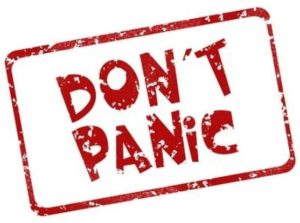How to Prevent Panic Attacks: Effective Strategies for Coping
It’s normal to feel anxious when faced with a challenging situation, like a job interview, public speaking, or taking a test. But if your anxiety is so severe that it interferes with your everyday life, you may have a panic disorder.
This is a type of anxiety disorder that is characterised by recurrent and unexpected panic attacks. A panic attack is a period of intense fear or discomfort that peaks within minutes and typically lasts for several hours.
 During a panic attack, you may experience physical symptoms such as a racing heart, sweating, shaking, shortness of breath, and dizziness. You may also have feelings of detachment, fear of losing control, or fear of dying. If you have a panic attack, you may live in constant fear of another panic attack and take steps to avoid situations that trigger them. In severe cases, panic disorder can lead to agoraphobia, which is a fear of being in public places or situations where escape may be difficult.
During a panic attack, you may experience physical symptoms such as a racing heart, sweating, shaking, shortness of breath, and dizziness. You may also have feelings of detachment, fear of losing control, or fear of dying. If you have a panic attack, you may live in constant fear of another panic attack and take steps to avoid situations that trigger them. In severe cases, panic disorder can lead to agoraphobia, which is a fear of being in public places or situations where escape may be difficult.
While there is no cure for panic disorder, it is treatable with medication and therapy.
Many people experience a panic attack at some point in their lives, but for some, these attacks can become a regular occurrence. Panic attacks are often characterised by a feeling of intense fear or anxiety, accompanied by physical symptoms. While a panic attack can be extremely frightening, it is important to remember that they are not harmful and do not last long. According to the National Institute of Mental Health, panic attacks affects approximately 6 million adults in the United States. If you or someone you know is struggling with panic attacks, there is help available. Talk to your doctor or a mental health professional to get started on the path to recovery.
What is a panic attack?
 A panic attack is a period of intense fear or discomfort that is accompanied by physical and psychological symptoms. These can include heart palpitations, shortness of breath, sweating, shaking, and feeling of detachment from reality. Panic attacks typically last for several minutes, but the experience can be extremely distressing. People with panic disorder often live in fear of having another attack and may avoid activities or situations that trigger their anxiety. However, with treatment, panic disorder can be managed and people can learn to cope with their symptoms.
A panic attack is a period of intense fear or discomfort that is accompanied by physical and psychological symptoms. These can include heart palpitations, shortness of breath, sweating, shaking, and feeling of detachment from reality. Panic attacks typically last for several minutes, but the experience can be extremely distressing. People with panic disorder often live in fear of having another attack and may avoid activities or situations that trigger their anxiety. However, with treatment, panic disorder can be managed and people can learn to cope with their symptoms.
The first panic attack was described in medical literature in 1871 by French neurologist Jean-Martin Charcot. He called it a “grande hysterie” and characterised it as a sudden onset of intense anxiety, accompanied by physical symptoms such as palpitations and shortness of breath. Since then, panic attacks have been widely studied and are now recognised as a common experience.
Panic attack symptoms
Some people experience only one panic attack in their lifetime, while others may have frequent attacks. The signs and symptoms of a panic attack and panic disorder symptoms may vary from person to person but can include:
 – Sudden onset of fear or anxiety
– Sudden onset of fear or anxiety
– Racing heart rate
– Sweating
– Trembling or shaking
– Shortness of breath or rapid breathing
– Choking sensation
– Chest pain
– Nausea or abdominal pain
– Dizziness or lightheadedness
– Tingling or numbness in the hands and feet
– Feelings of impending doom, panic or other symptoms
– Fear of losing control or going crazy
Causes of panic attacks
The exact cause of a panic attack is not known, but several factors may contribute to them or trigger panic attacks. Panic attacks typically include:
– Genetics: Panic disorder can run in families, so it may be passed down from one generation to the next.
– Brain chemistry: Imbalances in certain chemicals in the brain (such as serotonin and norepinephrine) may play a role in panic disorder. Your mental health may also play a part.
– Stressful life events: A major life event or a period of prolonged stress can trigger a panic attack. Major life changes can also affect how we feel.
– Medical conditions: Panic attacks can sometimes be brought on by an underlying medical condition, such as heart disease, thyroid problems, or respiratory disorders.
How to prevent panic attack symptoms
There are several things you can do to prevent panic attacks from occurring and to make sure you don’t develop panic disorder. These include:
 – Identifying your triggers: If you know what triggers your panic attacks, you can avoid those situations or learn how to cope with them in a healthy way. No two panic attacks are alike, but there is usually a trigger—or set of triggers—that sets them off. Common triggers include stress, anxiety, fear, and certain environmental factors. If you know what your triggers are, you can avoid them or learn how to deal with them in a healthy way, without worrying about the next panic attack.
– Identifying your triggers: If you know what triggers your panic attacks, you can avoid those situations or learn how to cope with them in a healthy way. No two panic attacks are alike, but there is usually a trigger—or set of triggers—that sets them off. Common triggers include stress, anxiety, fear, and certain environmental factors. If you know what your triggers are, you can avoid them or learn how to deal with them in a healthy way, without worrying about the next panic attack.
For some people, unexpected panic attacks are brought on by specific phobias or anxiety disorders, such as fear of flying or heights. In these cases, avoidance is the best strategy. If you have a fear of enclosed spaces, for example, try to avoid situations where you might feel trapped, such as elevators or long lineups. If avoidance is not possible or practical, you can try to desensitise yourself to your trigger by gradually exposing yourself to it in small doses. With the help of a therapist, you can work up to facing your fear head-on. A generalised anxiety disorder may also contribute to panic symptoms, and your doctor may prescribe selective serotonin re-uptake inhibitors to help with any overwhelming anxiety or sudden attacks.
 For other people, panic attacks may be triggered by more general factors, such as stress, anxiety or mental health problems. In these cases, it is often helpful to identify the thoughts or situations that make you feel anxious or stressed and then find healthy ways to cope with them. This might involve learning relaxation techniques, journaling about your feelings, or talking to a therapist
For other people, panic attacks may be triggered by more general factors, such as stress, anxiety or mental health problems. In these cases, it is often helpful to identify the thoughts or situations that make you feel anxious or stressed and then find healthy ways to cope with them. This might involve learning relaxation techniques, journaling about your feelings, or talking to a therapist
 Practicing relaxation techniques: One of the best ways to prevent panic attacks is to practice relaxation techniques on a regular basis. Yoga, meditation, and deep breathing are all excellent ways to reduce stress and anxiety levels. When panic attacks do occur, these techniques can also help to lessen their severity and duration. panic disorder is characterised by recurrent panic attacks, so it’s important to do everything you can to prevent them from happening in the first place. Relaxation techniques are a safe and effective way to do this. And, the more you practice them, the better your results will be, helping to prevent further attacks.
Practicing relaxation techniques: One of the best ways to prevent panic attacks is to practice relaxation techniques on a regular basis. Yoga, meditation, and deep breathing are all excellent ways to reduce stress and anxiety levels. When panic attacks do occur, these techniques can also help to lessen their severity and duration. panic disorder is characterised by recurrent panic attacks, so it’s important to do everything you can to prevent them from happening in the first place. Relaxation techniques are a safe and effective way to do this. And, the more you practice them, the better your results will be, helping to prevent further attacks.
– Getting regular exercise: Exercise can help to reduce stress and anxiety levels, as well as improve your overall mood. According to the Anxiety and Depression Association of America, exercise is an effective way to manage anxiety. anxiety symptoms can include panic attacks, fear, and worry. The first step in dealing with anxiety is to identify the cause. Often, anxiety is caused by stress. Exercise can help to reduce stress levels and improve your overall mood. This can in turn help to reduce anxiety levels. Exercise releases endorphins, which have mood-boosting effects. In addition, exercise can help to reduce tension and improve sleep quality. These are all important factors in managing anxiety.
– Seeing a therapist: If you’re struggling with panic attacks, seeing a therapist can be very helpful. A therapist can help you understand what’s causing your panic attacks and give you tools to cope with them. They can also provide support and understanding during difficult times. If you’re considering seeing a therapist for panic attacks, here are a few things to keep in mind. First, it’s important to find a therapist who specialises in anxiety and panic disorders. This will ensure that they have the knowledge and experience to help you. Second, therapy takes time. Don’t expect to see results overnight. Be patient and work collaboratively with your therapist to make progress. Finally, be prepared to do some work outside of therapy; your mental health is important. Your therapist may give you homework assignments or suggest relaxation techniques for you to practice at home. If you’re willing to put in the effort, seeing a therapist can be a very effective way to manage panic attacks.
What to do if a panic attack occurs
If you find yourself having a panic attack, there are several things you can do to try to calm down. These include:
– Focus on your breathing: Take slow, deep breaths in through your nose and out through your mouth. This will help to slow down your heart rate and ease feelings of anxiety.
– Find a safe place: If possible, remove yourself from the situation that is causing you anxiety. This may mean leaving a party or getting off of a crowded bus.
– Ride it out: Remember that panic attacks are not dangerous and they will eventually end. Try to focus on something else and ride out the attack until it passes. Try not to worry about repeated panic attacks.
How effective is hypnotherapy in preventing panic attacks?

When someone experiences a panic attack, it can feel like the world is crashing down around them. The heart races, the breath quickens, and the mind races through worst-case scenarios. For many people, panic attacks are a regular occurrence, one that can significantly reduce the quality of life. But what if there were a way to break the cycle of panic and anxiety? That’s where hypnotherapy comes in.
Hypnotherapy one of the psychological therapies that uses relaxation techniques to help patients achieve a state of deep relaxation. In this state, the mind is more susceptible to suggestion, making it an ideal treatment for panic and anxiety disorders. Studies have shown that hypnotherapy can be an effective treatment for panic attacks, with patients seeing a reduction in the frequency and severity of their attacks. If you’re struggling with panic attacks, hypnotherapy may be worth considering as a treatment option.
The NHS has a good reference page for getting more information: https://www.nhs.uk/mental-health/conditions/panic-disorder/
Conclusion
Panic attacks can be very frightening, but there are several things you can do to prevent them from occurring. If an attack does occur, try to focus on your breathing and ride it out until it passes. If you find yourself having panic attacks frequently, see a hypnotherapist for help in managing your anxiety.
If panic attacks are negatively impacting your quality of life, consider seeking help from a hypnotherapist. At the Hypnosis Clinic, our team of experts can help you manage your panic attacks and get back to living your life. Contact us today to learn more about our services or schedule a consultation. We’re here to help you take control of your anxiety and live a happier, healthier life.
Find out more about how we can help here: https://thehypnosisclinic.com/services/anxiety/
Your first consultation is free of charge. Book yours here: https://the-hypnosisclinic.cliniko.com/bookings#service

